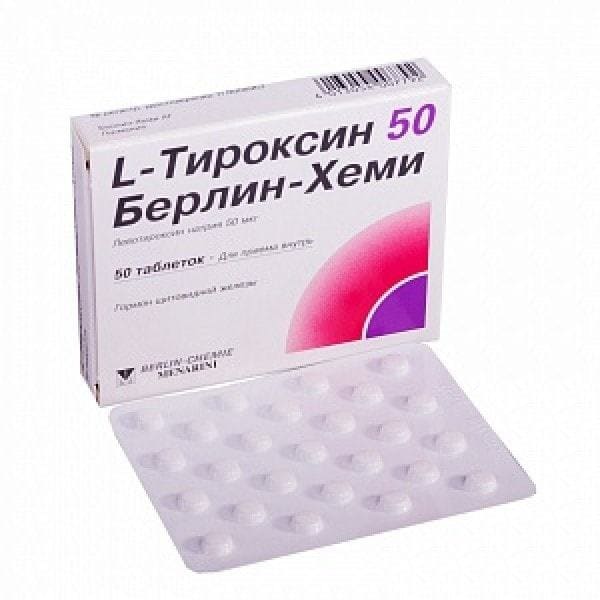You have no items in your shopping cart.

Sku:
levothyroxine sodium 50 mkg
Other ingredients: calcium hydrogen phosphate dihydrate, microcrystalline cellulose, sodium carboxymethyl starch (type A), dextrin, long-chain partial glycerides
Synthetic thyroid hormone drug, laevorotatory isomer of thyroxine. After partial conversion to triiodothyronine (liver and kidney) and enter the cells of the body, it affects the development and growth of tissue metabolism.
In small doses it has anabolic effect on protein and fat metabolism. In high doses, stimulates the growth and development, increase tissue oxygen demand, stimulates the metabolism of proteins, fats and carbohydrates, increases the functional activity of the cardiovascular system and CNS. In high doses, it inhibits the production TTRG hypothalamus and pituitary TSH.
The therapeutic effect is observed after 7-12 days, during the same time saved effect after discontinuation of the drug. The clinical effect of hypothyroidism is manifested through 3-5 diffuse goiter is reduced or disappears within 3-6 months.
Pharmacokinetics
Suction
After ingestion levothyroxine is absorbed almost exclusively in the upper small intestine. It absorbs up to 80% of the dose. Simultaneous eating reduces the absorption of levothyroxine. Serum Cmax achieved after about 6.5 hours after ingestion.
Distribution
Associated with serum proteins (thyroxine-binding globulin, thyroxine-binding prealbumin and albumin) by more than 99%. In various tissues occurs monodeyodirovanie levothyroxine about 80% to form a triiodothyronine (T3) and inactive ingredients.
Metabolism
Thyroid hormones are metabolized mainly in the liver, kidney, brain and muscles. A small amount of the drug undergoes deamination and decarboxylation as well as sulfuric acid and conjugated with glucuronic acid (in the liver).
breeding
The metabolites are excreted in the urine and bile.
T1 / 2 of 6-7 days.
Pharmacokinetics in special clinical situations
When thyrotoxicosis T1 / 2 is shortened to 3-4 days, and hypothyroidism is extended to 9-10 days.
In applying the drug on the testimony of the side effects are not observed at the recommended doses under medical supervision.
With increased sensitivity to the drug allergic reactions may occur.
In hypothyroidism, caused the defeat of the pituitary gland, it is necessary to find out whether there is a failure of the adrenal cortex simultaneously. In this case, the substitution therapy corticosteroids should be initiated prior to treatment of hypothyroidism with thyroid hormone to prevent the development of acute adrenal insufficiency.
Effects on ability to drive vehicles and management mechanisms
The drug has no effect on the ability to professional activities related to the driving of vehicles and management mechanisms.
- Hypothyroidism;
- Euthyroid goiter;
- As replacement therapy and for the prevention of goiter recurrence after resection of the thyroid gland;
- Thyroid cancer (after surgery);
- Diffuse toxic goiter: after achieving euthyroid state tireostatikami (in the form of combination or monotherapy);
- As a diagnostic tool for the test suppression of thyroid
- Untreated hyperthyroidism
- Acute myocardial infarction, acute myocarditis;
- Untreated adrenal insufficiency function;
- Increased individual sensitivity to the drug.
Precautions should be prescribed the drug for ischemic heart disease (atherosclerosis, angina pectoris, myocardial infarction), hypertension, arrhythmia, diabetes, severe long-existing hypothyroidism, malabsorption syndrome (may require dose adjustment).
Levothyroxine increases the effects of anticoagulants, which may require a reduction in their dose.
The use of tricyclic antidepressants with levothyroxine may result in increased action of antidepressants.
Thyroid hormones may increase the need for insulin and oral hypoglycemic drugs. More frequent monitoring of blood glucose is recommended during periods of initiation of treatment with levothyroxine, as well as a change in dose.
Levothyroxine reduces the effect of cardiac glycosides. With simultaneous use of cholestyramine, colestipol and aluminum hydroxide reduces the plasma concentration of levothyroxine by its inhibition of absorption in the intestine.
While the use of anabolic steroids, asparaginase, tamoxifen possible pharmacokinetic interaction at the level of protein binding.